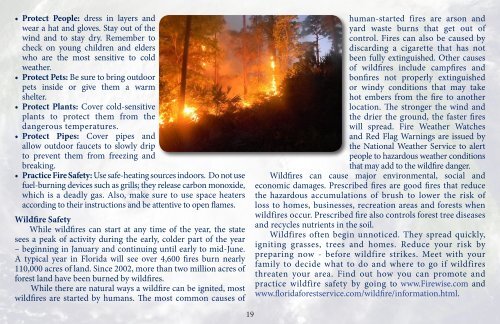2015 Guide
2015 Guide
2015 Guide
You also want an ePaper? Increase the reach of your titles
YUMPU automatically turns print PDFs into web optimized ePapers that Google loves.
• Protect People: dress in layers and<br />
wear a hat and gloves. Stay out of the<br />
wind and to stay dry. Remember to<br />
check on young children and elders<br />
who are the most sensitive to cold<br />
weather.<br />
• Protect Pets: Be sure to bring outdoor<br />
pets inside or give them a warm<br />
shelter.<br />
• Protect Plants: Cover cold-sensitive<br />
plants to protect them from the<br />
dangerous temperatures.<br />
• Protect Pipes: Cover pipes and<br />
allow outdoor faucets to slowly drip<br />
to prevent them from freezing and<br />
breaking.<br />
• Practice Fire Safety: Use safe-heating sources indoors. Do not use<br />
fuel-burning devices such as grills; they release carbon monoxide,<br />
which is a deadly gas. Also, make sure to use space heaters<br />
according to their instructions and be attentive to open flames.<br />
Wildfire Safety<br />
While wildfires can start at any time of the year, the state<br />
sees a peak of activity during the early, colder part of the year<br />
– beginning in January and continuing until early to mid-June.<br />
A typical year in Florida will see over 4,600 fires burn nearly<br />
110,000 acres of land. Since 2002, more than two million acres of<br />
forest land have been burned by wildfires.<br />
While there are natural ways a wildfire can be ignited, most<br />
wildfires are started by humans. The most common causes of<br />
19<br />
human-started fires are arson and<br />
yard waste burns that get out of<br />
control. Fires can also be caused by<br />
discarding a cigarette that has not<br />
been fully extinguished. Other causes<br />
of wildfires include campfires and<br />
bonfires not properly extinguished<br />
or windy conditions that may take<br />
hot embers from the fire to another<br />
location. The stronger the wind and<br />
the drier the ground, the faster fires<br />
will spread. Fire Weather Watches<br />
and Red Flag Warnings are issued by<br />
the National Weather Service to alert<br />
people to hazardous weather conditions<br />
that may add to the wildfire danger.<br />
Wildfires can cause major environmental, social and<br />
economic damages. Prescribed fires are good fires that reduce<br />
the hazardous accumulations of brush to lower the risk of<br />
loss to homes, businesses, recreation areas and forests when<br />
wildfires occur. Prescribed fire also controls forest tree diseases<br />
and recycles nutrients in the soil.<br />
Wildfires often begin unnoticed. They spread quickly,<br />
igniting grasses, trees and homes. Reduce your risk by<br />
preparing now - before wildfire strikes. Meet with your<br />
family to decide what to do and where to go if wildfires<br />
threaten your area. Find out how you can promote and<br />
practice wildfire safety by going to www.Firewise.com and<br />
www.floridaforestservice.com/wildfire/information.html.


